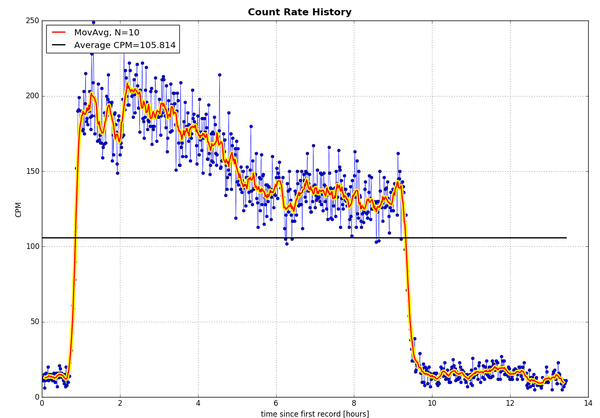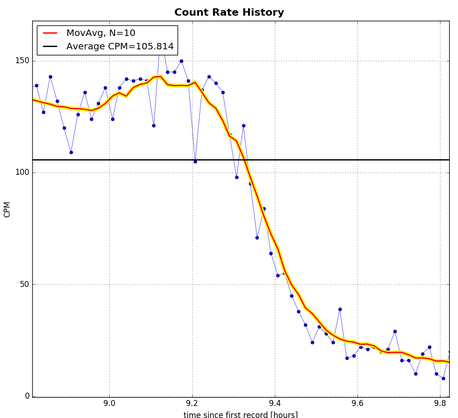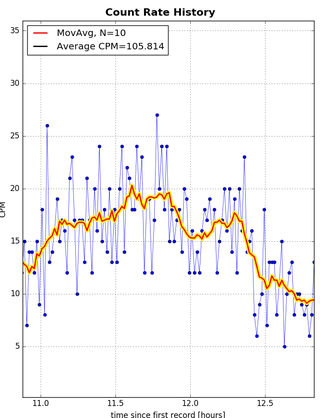| T O P I C R E V I E W |
| ullix |
Posted - 02/24/2017 : 12:35:04
The Python script, which I had announced a few weeks ago, is now available in an advanced version.
GeigerLog is a set of Python scripts developed on Linux Ubuntu Mate 16.04 to interact with GQ Electronic's GMC-300 Geiger counter.
The program allows reading of Geiger counter data, printing, logging to file, and creation of graphs, showing the Count Rate History over time; the latter as sec, min, hours, days. The graph is live auto-updated during logging; both axes can be either fixed or auto-scaled. The graphs can be stretched, shifted, and zoomed for details.
Time ranges can be set to analyze statistical properties of the data set within that range.
The history stored on the Geiger counter can be extracted and converted into files that can be analyzed and shown as described above.
The program is command line controlled. Various Geiger functions can be controlled from the command line.
A genuine recording of Geiger data from an international flight is included. When the GeigerLog scripts are run on this file (note instructions in README.TXT), it produces the first graph, showing the count rate from check-in to after landing. One sees the count rate increase with altitude, and the reduction of count rate during the flight. This is due to changing magnetic fields reducing the cosmic rays when going from north towards the equator. This effect is known since early last century. But then the device had a weight of almost a ton. Today it slips into a handbag ;-)
The little bump around 11-12h is due to a flight in a seaplane to the final destination.
The other 2 graphs are zoomed-ins from the first. (using the little controls you find on the lower left of the onscreen graphics)
You find the download here with instructions: https://sourceforge.net/projects/geigerlog/
Image Insert:

101557 bytesImage Insert:

58867 bytesImage Insert:

67999 bytes |
| 2 L A T E S T R E P L I E S (Newest First) |
| ullix |
Posted - 02/26/2017 : 07:35:54
Yes, missed the baudrate. But now have this too, as well as port, and both port and baudrate can be auto-discovered. Available as version 0.5.1 at sourceforge |
| Distelzombie |
Posted - 02/24/2017 : 12:59:05
Good work!
Im working on a Triangular Moving Average for this. Maybe you want to include it when its finished.
Again you hardcoded things like the baudrate. Maybe you want to include my "user interface" too. :P
I once had a problem where i couldnt read the data from serial port correctly, so i got like FFFFFFFFFFFF from getSERIAL and included according error handling
You know, I like this. It is fun to program again. Its the first time I'm programming Python and I dont have much experience with other languages. I once did c++.
I would like to get any response from you, though. :/
Edit: Im tired of waiting. Made my own sourceforge. You can copy the icon if you like it and use it too. |
|
|

